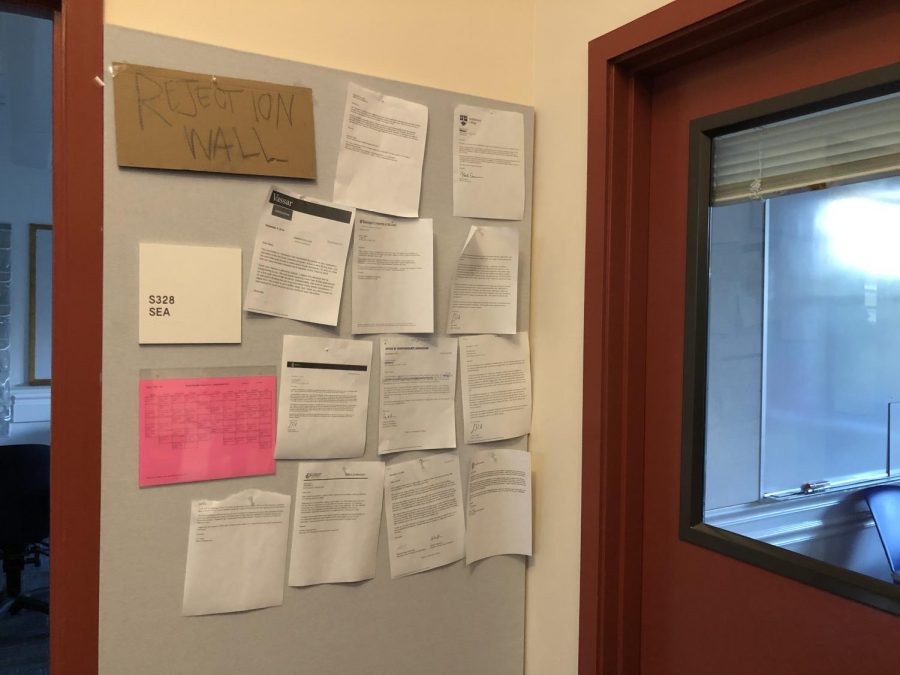Rejected: how Urban seniors react to college decisions
As Urban seniors finish up their college applications, the stress of being rejected or accepted to their dream schools sets in. Many students who applied Early Decision and Early Action have already heard back from their schools, and some of them have not been accepted. While the majority of Urban students will face a rejection from a college, students remain hesitant to talk about the decisions with their peers. The Rejection Wall is one way students can cope with being rejected without feeling singled out or shamed.
Urban’s tradition of the Rejection Wall may at first appear to be a slap in the face to everyone mourning the betrayal from the schools they applied to. But for others, the rejection wall is a reaffirmation that everyone is in the same boat right now: the college process is rough.
An anonymous senior and Esme Werner ‘20 agree that Urban’s rejection wall is a way to unite seniors as they receive decisions. “In a way, I really really like that Urban has [the rejection wall] because it made me feel like I wasn’t alone,” Anonymous said. “This is a collective feeling; I’m not alone; I’m not the only one who’s being rejected.”
“The rejection wall is really quite comforting,” Werner added. “It releases the pressure. It shows you you’re not the only one.”
However, Director of College Counseling Lauren Gersick disagreed. “I think the rejection wall feels like it doesn’t really capture [the complexity of this process] for me,” she said. “I think it sets a pretty lame tone for the [younger students].”
Gersick said one aspect of that complexity is a contradiction within Urban that makes the process difficult for students. “The way the system is designed is not fair,” Gersick said. “Urban is an intense college prep school on one hand, and, on the other, we want to encourage students to do what they love.” Urban’s values center around fairness and passion, which is not, in Gersick’s mind, what the college process is about.
Gersick also said another adjustment students have to make is that “for many Urban students, your life has been curated up to this point.” Many Urban students have had lots of support up to this point, and, for many, this is one of the first major life events in which they have faced rejection.
Some Urban seniors feel that they are not as supported by their teachers as they wish they were. “[Classes] were super tough with college apps… for the most part, teachers are not that understanding,” Anonymous said. “They still pile on the work, which is not the best.”
Even after rejections, some found support lacking. “After I got rejected, teachers [didn’t] really care,” Anonymous said, “I had a test the next day that I couldn’t really study for because I couldn’t focus on it, and I did super badly on it. My teacher didn’t think that was a valid enough excuse.”
Werner said that throughout the college process, “teachers were like ‘oh [college applications] suck, but weren’t you supposed to do that a while ago?’” Werner said that there was an unspoken competition among all the students. “I think the culture [at Urban] around rejection is really quite harsh,” she said. “Even though a ton of people get rejected, it’s still like, ‘is something wrong?’”
Anonymous added that in general, “it’s a super competitive time.”
After students are rejected, Anonymous said “It’s so hard not to take it personally. I was thinking a lot about what I didn’t have, what other people did have. It really takes a toll on your self worth.”
Both Urban students and the college counselors agree that the community needs to get better at talking about the emotional effects of applying to college. “If there are other ideas that the students have about how we can [improve] the culture around talking around rejection, we would love to hear them,” said Associate Director of College Counseling Elizabeth Harris. While there is no way to avoid rejection, the Urban community can be more supportive of seniors as they apply to college. Ultimately, part of the application process is getting rejected. “If you’re not hearing no, you’re not doing this process right,” Gersick said.”Part of this process is putting yourself out there.”

